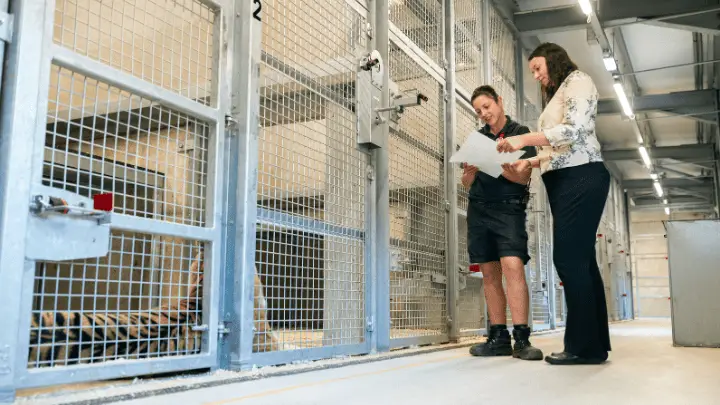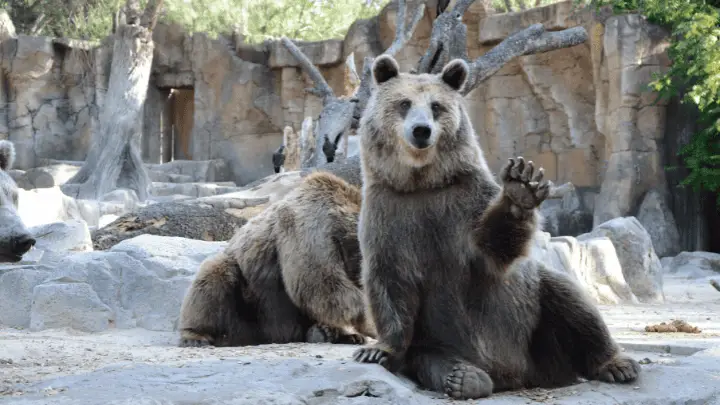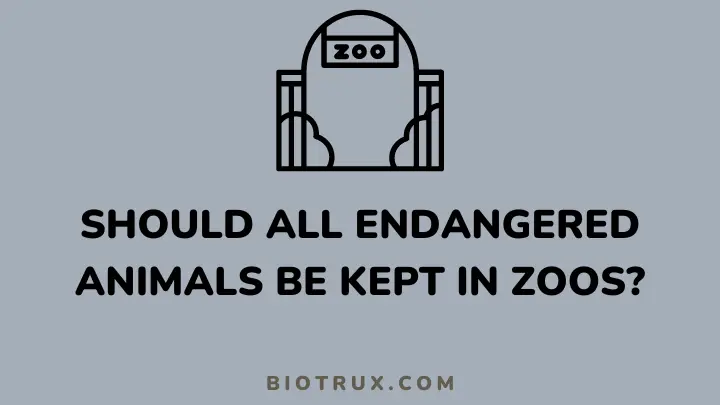Welcome to a journey of discovery and debate, where you ponder a question as old as conservation itself: Should all endangered animals be kept in zoos? Imagine a world where the only place to see an endangered animal is in a zoo.
Would you feel a sense of security knowing they’re safe from poachers and habitat loss, or would you feel a pang of sadness, realizing that they’re miles away from their natural home?
As you journey through this article, you’ll discover the role of zoos in conservation, the reasons behind the many controversies, and the future of zoos in conservation efforts. Let’s dive in.
The Role of Zoos in Conservation
Breeding programs
Zoos play a pivotal role in the conservation of endangered animals. One of the key strategies they employ is the implementation of specialized breeding programs. These programs are designed to ensure the survival of endangered species and maintain their genetic diversity.
Species survival plans
Species survival plans are one of the primary tools zoos use in their conservation efforts. Various zoos and aquariums around the world coordinate these plans to manage the breeding of a species.
Species survival plans aim to maintain a healthy and genetically diverse population of the species in captivity, thereby ensuring its survival. They also involve research, public education, reintroduction, and field projects to support the conservation of the species in the wild.
Zoos can effectively implement species survival plans in a controlled environment. It is worth noting this when considering whether all endangered animals should be kept in zoos.
Genetic diversity
Maintaining genetic diversity is crucial for the survival of a species. A genetically diverse population has a better chance of surviving disease outbreaks, environmental changes, and other threats.
Zoos play a critical role in preserving genetic diversity through their breeding programs. They carefully manage the genetic makeup of their animal populations to prevent inbreeding and ensure the health and vitality of future generations.
This is another point to consider when discussing whether all endangered animals should be kept in zoos. Without zoos, many endangered species would have a much harder time maintaining genetic diversity, which is essential for their long-term survival.
Education and awareness
Zoos are not just about entertainment; they play a crucial role in educating the public about endangered animals. They provide firsthand experiences that no documentary can match. This raises the question, should all endangered animals be kept in zoos?
While opinions vary, the educational value of zoos is undeniable. They foster awareness about the plight of these animals and the need for conservation. Zoos inspire visitors to appreciate wildlife and understand the urgency of protecting it.
Protection from habitat destruction and poaching
Zoos serve as sanctuaries for endangered animals, protecting them from threats like habitat destruction and poaching. As natural habitats shrink and illegal hunting persists, the question arises: should all endangered animals be kept in zoos?
Zoos offer a controlled environment where these species can live safely. They provide necessary care, nutrition, and protection from predators, including humans. Zoos also work towards restoring and preserving natural habitats.
Research and scientific advancements
Zoos are at the forefront of research and scientific advancements in animal conservation. They provide a unique platform for scientists to study endangered species up close, leading to breakthroughs in veterinary medicine and wildlife biology. The research conducted in zoos not only benefits the animals in captivity but also contributes to conservation efforts in the wild.
Should All Endangered Animals Be Kept in Zoos?

Ethical considerations
Zoos can protect endangered animals, but is it ethical? On one hand, zoos provide safety and food, reducing the risk of extinction. However, animals lose their freedom, which is a significant ethical concern.
They are confined and cannot live naturally, which can lead to stress and abnormal behaviors. Moreover, not all zoos provide adequate care. So, while zoos can play a role in conservation, it’s crucial to consider the ethical implications.
We must strive for a balance, perhaps focusing on improving natural habitats and using zoos as a last resort. After all, every animal deserves a life of dignity and freedom.
The impact of captivity
Keeping endangered animals in zoos has a profound impact on their lives. In captivity, animals are unable to engage in natural behaviors, which can lead to physical and mental health issues. They often have limited space, which can cause stress and aggression.
Furthermore, captivity can disrupt an animal’s natural life cycle, including mating and hunting. While zoos can contribute to conservation efforts, the impact of captivity on the well-being of animals still remains an issue.
It’s essential to consider these impacts and explore alternatives, like wildlife reserves, that allow animals to live in more natural conditions.
Alternatives to captivity
The question, “Should all endangered animals be kept in zoos?” is a complex one. While zoos can play a role in conservation, some schools of thought believe that there are alternatives that may better serve these animals.
- Wildlife reserves: These provide larger, more natural habitats for animals, allowing them to roam freely.
- Conservation breeding: This involves breeding animals in controlled environments, with the goal of reintroducing them into the wild.
- Habitat restoration: Efforts to restore and protect natural habitats can help endangered species thrive in their native environments.
- Anti-poaching measures: Strengthening laws and enforcement against poaching can protect endangered animals.
Each of these alternatives offers a different approach to the same goal: preserving endangered species without the need for captivity.
Why Are There Many Controversies on Whether Endangered Animals Be Kept in Zoos?
The controversy surrounding the question, “Should all endangered animals be kept in zoos?” stems from differing perspectives on animal rights, conservation, and ethics.
1. Animal rights: Some activists argue that keeping endangered animals in zoos infringes on their rights to freedom. They advocate that we should not compromise the rights of individual animals for the benefit of the species.
2. Conservation: While zoos can contribute to conservation efforts, critics argue that most species in zoos are not endangered and that many zoos do not participate in reintroduction programs.
3. Ethics: There’s a debate about whether it’s ethical to keep animals in captivity, where they may suffer from stress, abnormal behaviors, and limited freedom.
4. Effectiveness of zoos: Critics question whether zoos are truly achieving their claimed conservation goals.
These differing viewpoints fuel the ongoing debate about the role of zoos in animal conservation.
What is the Future of Zoos in Keeping Endangered Animals?

The future of zoos in keeping endangered animals is evolving. Zoos are encountering challenges and circumstances that are obliging them to make significant changes. They are becoming more active in conservation and are increasingly seen as “conservation arks” for endangered species.
Zoos are also leading in field conservation projects such as the reintroduction of captive-born animals to the wild. They are developing programs dedicated to protecting endangered species, both in captivity and the wild.
These programs involve captive breeding, reintroduction programs, public education, and field conservation. However, zoos also face challenges like maintaining genetic diversity in captive breeding programs and the complexities of reintroducing animals into the wild.
Technological advancements and international collaboration are improving their effectiveness, but conservation remains a long-term commitment.
In summary, the role of zoos is shifting from just housing animals to actively participating in their conservation. However, this transition comes with its own set of challenges that need to be addressed.
FAQs
Are zoos necessary for conservation efforts?
Zoos help protect endangered species by providing safe habitats and breeding programs to increase their population. However, the effectiveness of these efforts varies depending on factors such as habitat protection and public support.
Do zoos prioritize animal welfare?
Zoos strive to prioritize animal welfare through enrichment activities, veterinary care, and naturalistic habitat design. However, concerns remain regarding the psychological well-being of animals in captivity and the ethical implications of their confinement.
What are the alternatives to keeping endangered animals in zoos?
Alternatives to keeping endangered animals in zoos include conservation in the wild, protected reserves, and sanctuaries focused on rehabilitation and release. These approaches aim to minimize the impact of captivity while still supporting conservation goals.
How do zoos contribute to public education?
Zoos contribute to public education through interactive exhibits, educational programs, and outreach initiatives aimed at raising awareness about conservation issues. By engaging visitors of all ages, zoos inspire action and advocacy for wildlife protection.
Final Verdict: Should All Endangered Animals Be Kept in Zoos
The debate on whether all endangered animals should be kept in zoos is a complex one, with valid arguments on both sides. Zoos offer protection and conservation efforts but at the cost of an animal’s freedom and natural behavior. The ethical considerations and the impact of captivity cannot be ignored.
However, the future of zoos is evolving. They are becoming more than just a place to see animals; they are turning into conservation hubs, actively participating in the preservation of species.
In conclusion, while zoos have their place in conservation, they should not be the only solution. Alternatives like wildlife reserves, conservation breeding, habitat restoration, and anti-poaching measures offer promising paths forward.
The goal should always be to ensure the well-being and survival of these precious species in the most ethical and effective way possible.
You can also learn more about ex-situ conservation of biodiversity.
Thanks for reading.

